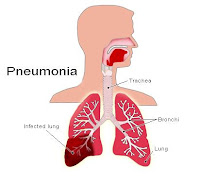* Protects baby (children) from exposure to cigarette smoke, air pollution and the crowds that have the potential transmission.
* Protects your baby (child) from contact with people with shortness of breath.
* Familiarize breastfeeding.
* Immediate treatment if we find the child has fever, cough, colds. Especially if accompanied by hoarseness, shortness of breath and a tug on the muscles between the ribs (retractions).
* Check back in 2 days if improvement has not been revealed. And immediately to the hospital if the child's condition worsens.
* Hib immunization (to provide immunity against Haemophilus influenzae, Heptavalen Pneumococcal vaccine (to prevent IPD = invasive pneumococcal diseases) and influenzae vaccination in high risk children, primarily ages 6-23 months. Unfortunately this vaccine can not be enjoyed by all children because the price is quite expensive.










